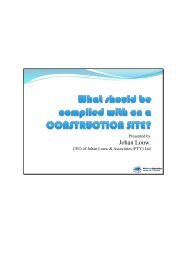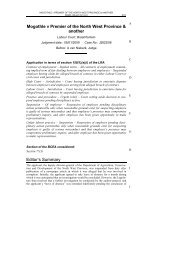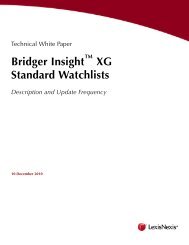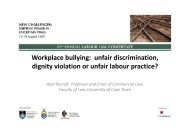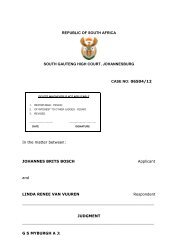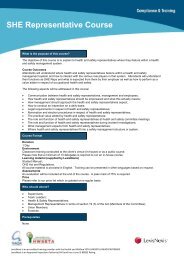Makhanya v University of Zululand - LexisNexis South Africa
Makhanya v University of Zululand - LexisNexis South Africa
Makhanya v University of Zululand - LexisNexis South Africa
Create successful ePaper yourself
Turn your PDF publications into a flip-book with our unique Google optimized e-Paper software.
12excluding the ordinary power <strong>of</strong> the high court in such cases (it does thatwhen ‘exclusive jurisdiction’ is conferred on the special court). Or it will doso by conferring power on the special court without excluding the ordinarypower <strong>of</strong> the high court (by conferring on the special court jurisdiction to beexercised concurrently with the original power <strong>of</strong> the high courts). In thelatter case the claim might be brought before either court.[26] In the present context exclusive jurisdiction to enforce LRA rights hasbeen assigned to the Labour Forums. But in respect <strong>of</strong> the enforcement <strong>of</strong>both contractual and constitutional rights the high courts retain their originaljurisdiction assigned to them by the Constitution. In both cases equivalentjurisdiction has been conferred upon the Labour Court to be exercisedconcurrently with the high courts.[27] Naturally a claim that falls within the concurrent jurisdiction <strong>of</strong> boththe high court and a special court could not be brought in both courts. Alitigant who did that would be confronted in one court by either a plea <strong>of</strong> lispendens (the claim is pending in another court) or by a plea <strong>of</strong> res judicata(the claim has been disposed <strong>of</strong> by the other court). A claimant who has aclaim that is capable <strong>of</strong> being considered by either <strong>of</strong> two courts that haveconcurrent jurisdiction must necessarily choose in which court to pursue theclaim and, once having made that election, will not be able to bring the sameclaim before the other court. But where a person has two separate claims,each for enforcement <strong>of</strong> a different right, the position is altogether different,because then both claims will be capable <strong>of</strong> being pursued, simultaneouslyor sequentially, either both in one court, or each in one <strong>of</strong> those courts.




